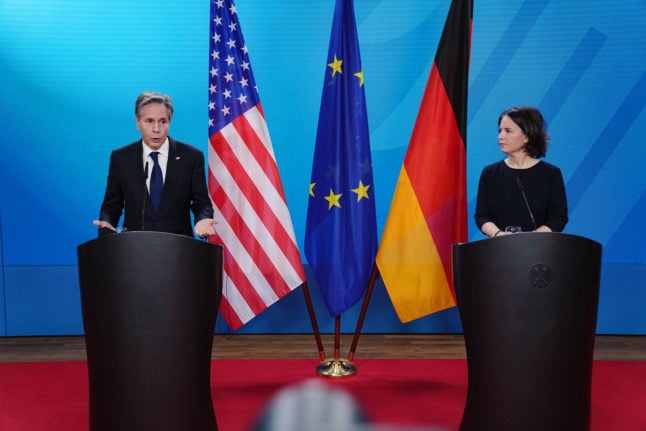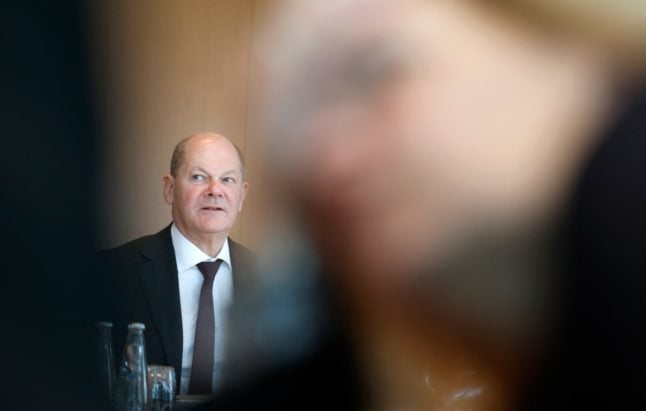In a phone call on Thursday evening, the two leaders agreed that “further military aggression by Russia against Ukraine must be averted”, the German chancellery said in a statement.
Downing Street said Scholz and Johnson had “shared their deep concern at the ongoing destabilising action by Russia in Ukraine, and said any invasion into Ukraine would be a severe strategic mistake”.
“The prime minister stressed the importance of NATO allies working together on a coordinated response,” it said in a statement.
Fears are mounting that a major conflict could break out in Europe as tens of thousands of Russian troops mass on Ukraine’s border, along with an arsenal of tanks, fighting vehicles, artillery and missiles.
In a bid to defuse the worst tensions between Russia and the West in decades, US Secretary of State Antony Blinken is on a whirlwind diplomatic tour that took him to Berlin on Thursday before a meeting with Russian Foreign Minister Sergei Lavrov in Geneva on Friday.
Speaking to journalists in Berlin, Blinken warned that Russia risked reviving Europe’s dangerous Cold War era of division as it threatens Ukraine.
“To allow Russia to violate those principles with impunity would drag us all back to a much more dangerous and unstable time, when this continent, and this city, were divided in two… with the threat of all-out war hanging over everyone’s heads,” he said.
The United States and its allies have warned Moscow of grave consequences if “any” of the troops massed on the border were to cross the border into Ukraine.
READ ALSO: Germany’s Scholz supports Ukraine amid Russian invasion fears
‘Grave consequences’
Appearing alongside Blinken, German Foreign Secretary Annalena Baerbock urged Russia to “take steps towards deescalation”.
“Any further aggressive stance, any further aggression, would have grave consequences,” she said. “Nothing less is at stake than the preservation of the European peace order.”
Baerbock added that the Western allies would not shy away from taking action, even if that included measures that “could have economic consequences for ourselves”.
The recently completed — but not yet certified — Nord Stream 2 pipeline, which is due to double Russian gas supplies to Germany, has long been seen as a possible bargaining chip in the crisis.
READ ALSO: German regulator suspends Nord Stream 2 approval process
Although Germany has previously insisted the pipeline was merely a commercial project and should not be halted for political reasons, Chancellor Olaf Scholz recently said “everything” was on the table.
Moscow insists it has no plans to invade Ukraine but has at the same time laid down a series of security demands — including a ban on Ukraine joining NATO — in exchange for de-escalation.
In London, British Prime Minister Boris Johnson said any Russian incursion into Ukraine “would be a disaster for the world”.



 Please whitelist us to continue reading.
Please whitelist us to continue reading.
Olaf Sholz won’t do anything apart from complain to Russia. We can’t complain too much though, we can’t have Russia turn off the taps. They’ve got us by the short and curleys.
This is what green policies do. This will bite us in the arse hard. Fun times 2022.
Reliance on gas energy is not a “green policy”. It is, on the contrary, a consequence of not enough green policies. This is one area where taking action to mitigate the climate emergency and foreign policy are entirely in sync. Green energy = independent energy.
And shutting down nuclear power plants? Nuclear is currently the best option we have for reliable clean energy. Granted we need to figure out the waste problem. But there are ways to use the waste for more energy.
The only green policies that we take is to turn off everything that might pollute and then figure out how to keep the lights on. Resulting in the reliance on gas. ( Germany has the lowest reserves of gas scince 2012 and has never needed as much as we do now.)
The green policies were using are environmental disasters for the future. Weve just taken a huge punt and kicked the can further down the road by about 10 years. ( the typical space between these “emergencies “. Where all the rich people take private jets to fly all over the world to tell us stupid people not to travel. The next one is in Egypt. If it was such a problem why can’t they use zoom?)
Take a look at electric cars. You need one to run about 20 years to offset the carbon footprint of building it but the battery has a life span of 10 years. Youll never catch up. And the cars still use tremendous amount of oil.Lets not get started on the mining of lithium which in itself is a disaster. Let alone disposal.
We have better options but its all about the money.
You need to stop thinking of the climate as an emergency. In an emergency people panic and make stupid mistakes. The climate is going to change. Its done that before we were here its going to do it once we are gone.
We need to mitigate the impact we have on the environment. For example plastic face masks have gone in our oceans their prevalence is up over 9.000% since 2019. How hard is it to dispose of them correctly?
If you want to truly sort out climate change. You need to fix peoples time horizon. If there are people who are having to think of; do I heat or, do I eat. They won’t care about the environment. They are worried about today and tomorrow. They can’t think about 10 years time because they have huge problems within the next 24 hours.
Green policies only serve to make the poor. Poorer. Which lowers time horizon. Which lessen how much people care about the environment.
If you want to fix climate change fix this problem and I guarantee our impact on the environment would be reduced. Or we could keep adding carbon taxes to fuel at the petrol station while the EU exempts private yachts and aircraft. If the poor can’t afford fuel they can’t pollute.
Spot on.
Most people are concerned about the “here and now” with their day-to-day lives, and not about achieving “climate neutrality” within 25 years. Hard for people to relate to this concept; it’s something you can’t taste, touch or feel.
It’s going to take decades to replace fossil fuel with suitable renewable energy, and a detailed transition plan to make it happen. One cannot simply turn off reliance on fossil fuel and go “green” overnight. It will require fossil fuel and sufficient time to make this transition in a smart, prudent fashion.
Germany should remember that its own re-unification only happened because certain other countries stood firm against the Soviets. Those same countries now expect Germany to show a bit of backbone and cut out the double-talk, no-fly zones for Brit military and demonstrate they’re a proper ally.